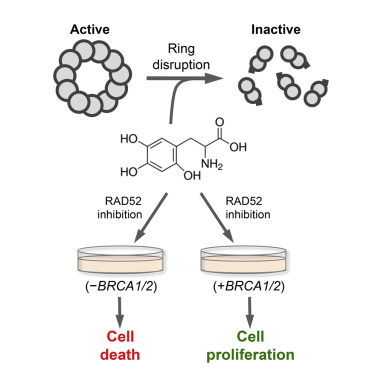Highlights
- Small-molecule inhibition of RAD52 activity in vitro and in vivo
- Small-molecule dimerization of RAD52 undecamer rings
- Small-molecule disruption of RAD52 ring superstructures
- Small-molecule inhibition of RAD52 selectively kills BRCA-deficient cells
Summary
Suppression of RAD52 causes synthetic lethality in BRCA-deficient cells. Yet pharmacological inhibition of RAD52, which binds single-strand DNA (ssDNA) and lacks enzymatic activity, has not been demonstrated. Here, we identify the small molecule 6-hydroxy-DL-dopa (6-OH-dopa) as a major allosteric inhibitor of the RAD52 ssDNA binding domain. For example, we find that multiple small molecules bind to and completely transform RAD52 undecamer rings into dimers, which abolishes the ssDNA binding channel observed in crystal structures. 6-OH-Dopa also disrupts RAD52 heptamer and undecamer ring superstructures, and suppresses RAD52 recruitment and recombination activity in cells with negligible effects on other double-strand break repair pathways. Importantly, we show that 6-OH-dopa selectively inhibits the proliferation of BRCA-deficient cancer cells, including those obtained from leukemia patients. Taken together, these data demonstrate small-molecule disruption of RAD52 rings as a promising mechanism for precision medicine in BRCA-deficient cancers.







